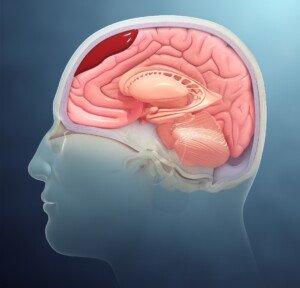Hitting your head on a bathtub after falling can cause bleeding in the brain, but should you rush to the ER simply because you bonked your head on the bathtub?
What if you’re fully conscious and “feel fine” afterwards?
Symptoms of the brain bleed may not begin occurring until weeks after you hit your head on the bathtub!
Bathtubs are hard as hell.
I will never forget that distinctive “THUD!” at about 8:45 that morning. I immediately knew what it was and raced up the stairs and into my parents’ bedroom to get to the bathroom, calling for my mother.
She was lying on the floor, head and shoulders propped up against the side of the bathtub. I knew exactly what had happened.
She had passed out while standing and fell, dead weight, to the floor, hitting her head on the bathtub along the way.
She had very severe orthostatic hypotension and was supposed to alert me whenever she got up from a lying or seated position, so that I could prevent the falls when she passed out.
This time she didn’t alert me; I had been snoozing downstairs on the sofa.
My mother was conscious immediately after hitting her head on the bathtub (I was up there in seconds).
I helped her up and examined her head, finding no bump or blood.
My mother wasn’t 100 percent alert, though, because at first she told me she had not hit her head.
I pressed about this, and then she said she had indeed.
She also told me, after I had asked, that she did not have a headache, was not in pain.
I helped her into bed, and all I could think about was a subdural hematoma (brain bleed).
Ever since my mother developed the mysterious orthostatic hypotension, I had feared subdural hematoma from falling and hitting her head; I couldn’t be with her 24 hours a day.
Based on the sound that her head had made when it hit the bathtub, I wasn’t convinced that there wasn’t a bump somewhere on her head — and a ripe condition to trigger a brain bleed.
Check Victim’s Head; Don’t Take Their Word for It
I told her to point to exactly where she’d hit her head on the bathtub.
I pulled away at her hair and, sure enough, there was a section of matted blood on her hair.
“We’re going to the ER!” I announced. “There’s blood on her head!” I told my father.
If someone in the household hits their head on the bathtub and you find them lying on the floor fully conscious, consider taking them to the ER.
“After sustaining head trauma by hitting someone’s head against a bathtub, an urgent medical evaluation may be in order,” says Natasha Fuksina, MD, an internal and integrative medicine specialist who combines traditional and functional medicine to restore health and function.
Dr. Fuksina continues, “An elderly person on multiple medications, including blood thinners (such as Coumadin, Eliquis, Xarelto), can quickly develop a subdural hematoma (bleeding outside of the brain underneath the skull) or bleeding inside of the brain.
“If a person felt faint and dizzy and that resulted in a fall and hitting the head on the bathtub, with or without loss of consciousness, they have to be evaluated in the ER regardless of their age.”
The victim’s description of what happened or “where it hurts” may not be accurate due to compromised mentation.
The CT scan of my mother’s brain was normal, but she was held overnight for observation and a follow-up scan the next morning, which was normal.
I asked the doctor, “Is there a possibility that a few months from now, there could be bleeding in her brain from this?” He said that there was a very “slim” chance.
Six weeks later, following six weeks of normalcy as far as no neurological symptoms, my mother awakened with a blazing headache and significant lower body weakness.
I took her to the ER and sure enough, the CT scan showed a chronic subdural hematoma!

Scientific Animations, CC/BY-SA/Attribution-ShareAlike 4.0 International
Though the initial ER visit results were negative, don’t let this keep you from going to the ER a second time.
And sometimes the bleeding will be evident 24 hours later on that follow-up CT.
Age of the victim plays into this. A brain bleed is far more likely in an elderly person who hits their head on a hard surface like a bathtub from a fall.
It’s way more likely, in fact, when compared to a young adult or even middle-aged person.
“A young person or middle-aged adult will most likely not sustain any life-threatening head injuries from hitting their head on a bathtub,” says Dr. Fuksina.
“If someone develops dizziness and changes in consciousness, then prompt medical attention is still warranted.”
So regardless of age, if there are neurological symptoms, get to the ER!
If the person is elderly but shows no symptoms (nausea, worsening headache, confusion, amnesia, off-balance), get them to the ER, but don’t panic.
Remember, a bathtub is as good as concrete when hitting your head.
 Dr. Fuksina is the founder of astraMDhealth, which includes telemedicine. Double board certified in internal and obesity medicine, she focuses on a personalized approach, including metabolism and genetic makeup, to customize treatments and preventive care.
Dr. Fuksina is the founder of astraMDhealth, which includes telemedicine. Double board certified in internal and obesity medicine, she focuses on a personalized approach, including metabolism and genetic makeup, to customize treatments and preventive care.
 Lorra Garrick has been covering medical, fitness and cybersecurity topics for many years, having written thousands of articles for print magazines and websites, including as a ghostwriter. She’s also a former ACE-certified personal trainer.
Lorra Garrick has been covering medical, fitness and cybersecurity topics for many years, having written thousands of articles for print magazines and websites, including as a ghostwriter. She’s also a former ACE-certified personal trainer.
.
Top image: ©Lorra Garrick
Normal CT Scan After Hitting Head: Brain Bleed Can Still Occur
Can Chronic Subdural Hematoma with Symptoms Go Away on Its Own?
Slip & Fall, Hit Head Hard on Concrete: Brain Bleed Prevention
Hit Head? Bleeding in Brain Symptoms Can Occur Six Weeks Later














